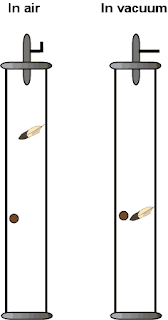G= gravitational constant- 6.67x10 -11 (six point six seven multiplied by ten raise to minus )
its unit is (Nm2)/Kg2
Difference in the attraction of body at poles and equator
The maximum force of attraction between the objects are seen at the poles and minimum at the equator .
this is due to the shape of the earth .earth is in 'geoid' in shape .That is at the poles the distance from the center is comparatively less than the distance from the center to the equator.
Feather coin experiment by newton
newton put a coin and a feather in a long glass tube. he held the tube vertically and suddenly turned it upside down. he found that the feather reached the other end a bit later . He repeated the experiment after removing all the air from the tube this time he found that both reached the other end at the same time.
In the feather coin experiment the feather experiences the frictional force exerted by the air since it has a flat surface but the coin which has comparatively less surface area don't experience much friction.


No comments:
Post a Comment